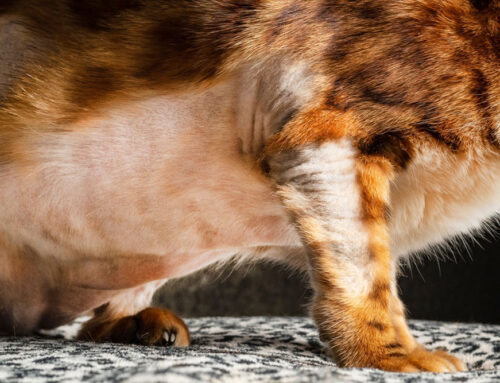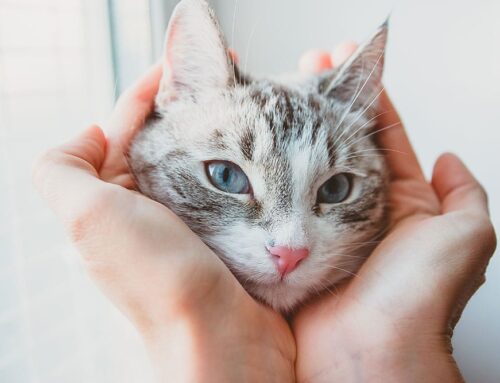Cats commonly experience hair loss, and the condition presents in many ways. Our Just Cats Clinic team is here to provide you with information on how we diagnose and manage cats’ hair loss.
Cats’ hair loss causes
Cats’ hair loss can be partial or complete, and may be caused by one of many conditions, including:
- Allergies — Cats’ allergies typically manifest as itchy skin and skin lesions, which lead to hair loss. Common cat allergies include fleas, environmental allergens, and food.
- Demodectic mange — Microscopic Demodex mites cause this inflammatory skin disease, which leads to cats’ itching, crusty skin lesions, and hair loss.
- Ringworm — This fungal infection can affect cats’ skin, hair, and nails, and typically manifests as circular, thickened skin patches surrounded by hair loss on the head, chest, front limbs, and spine. Ringworm can become more generalized, affecting large body areas.
- Underlying Disease — Diseases such as diabetes, hyperthyroidism, cystitis, or cancer can lead to hair loss, for a variety of reasons.
- Pain or Stress — Cats who are in pain or stressed may overgroom, resulting in hair loss.
Diagnosing and treating your cat’s hair loss
Many conditions can cause your cat’s hair loss, making diagnosis complex and time-consuming. If your cat has hair loss, your veterinarian may recommend the following tests:
- Blood work — Blood work (e.g., complete blood count, biochemistry panel, and—potentially—a thyroid panel) can determine underlying conditions.
- Rule out flea allergies — Flea allergies are the most common culprit of cats’ skin disease. Finding a flea or flea dirt (i.e., flea droppings) on your cat can indicate a flea problem, but many cats are fastidious about grooming, removing all fleas, and making a flea allergy diagnosis difficult. If they are unable to resolve your cat’s hair loss, some veterinarians will refer you to a veterinary dermatologist, who will likely recommend six months’ flea prevention before proceeding with diagnostics, This is why our team starts your cat on a year-round, monthly Revolution Plus administration, to rule out flea allergy as your cat’s hair loss cause.
- Skin scraping — Once our veterinarian eliminates fleas as the cause of your cat’s hair loss, we will recommend skin scraping to perform cytology and fungal cultures, which helps rule out bacterial infections, demodectic mange, and ringworm. If your cat has any of these conditions, our veterinary team may prescribe antibiotics or antifungal medications.
- Allergy testing — Environmental allergies (i.e., atopy) are the second most common allergy affecting cats. After eliminating other conditions, our veterinarian will recommend allergy testing (e.g., intradermal skin testing, blood tests) to determine whether environmental allergens are responsible for your cat’s hair loss.
- Treating atopy — Atopy can be difficult to manage, and typically requires a multifaceted approach that includes:
- Hyposensitization therapy — This gold standard treatment uses your cat’s allergy test results to create antigen shots. Our veterinary team will administer gradually increasing antigen doses to desensitize your cat to the allergens causing their reaction. This treatment can take six months to a year to be fully effective, and most cats will need the antigen shots throughout their life.
- Anti-inflammatories — Your veterinarian may prescribe steroids, especially if your cat has other signs, such as skin lesions and itchy skin.
- Omega-3 fatty acids — Omega-3 fatty acid supplements may improve your cat’s skin health.
- Bathing — Weekly bathing may help remove allergens from your cat’s skin, and decrease inflammation.
- Skin biopsies — If atopy is eliminated as the cause of your cat’s hair loss, a skin biopsy may be necessary to help diagnose the condition.
- Addressing pain or stress — If pain or stress are causing your cat to overgroom, resulting in hair loss, you need to determine the cause. Arthritis is a common cause of feline pain, whereas changes in your cat’s environment, and boredom are issues that commonly cause cats’ anxiety.
Preventing your cat’s hair loss

Many cats’ hair loss conditions cannot be prevented, but you can decrease your cat’s hair loss risk by doing the following:
- Providing year-round flea prevention — Protect your cat from fleas by ensuring they receive year-round flea prevention medicine.
- Scheduling regular wellness visits — Your veterinarian should evaluate your cat at least once per year to detect health conditions that could cause hair loss, and to ensure they are not suffering from painful conditions such as arthritis.
- Ensuring your cat receives adequate enrichment — Cats need mental and physical enrichment to remain sufficiently stimulated. Keep your cat’s boredom at bay through frequent playtime, and by providing a vertical climbing tree and a window view.
Many conditions can cause a cat’s hair loss, and determining the underlying issue is the only way to manage the problem. If your cat is experiencing hair loss, contact our American Animal Hospital Association (AAHA)-accredited team at Just Cats Clinic, so we can start the diagnostic process and determine their treatment needs.













